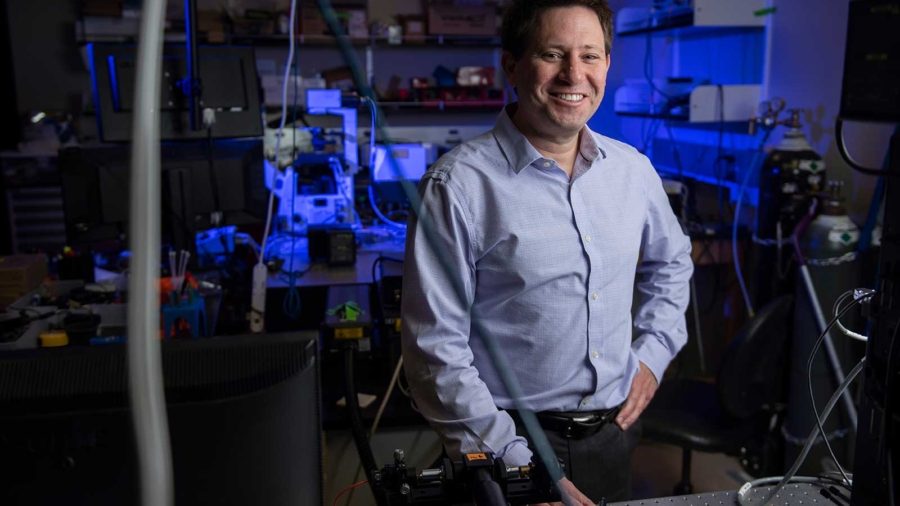Botvinick to Develop First-of-its-Kind Diabetes Monitor
Elliot Botvinick, professor of biomedical engineering, has been awarded a three-year, $3.5 million grant from The Leona M. and Harry B. Helmsley Charitable Trust to further the development of an innovative continuous-use monitor for those with Type 1 diabetes. The first-of-its kind device will simultaneously measure insulin, glucose, lactate, oxygen and the ketone body beta-hydroxybutyrate with a single probe inserted just beneath the skin.
Called iGLOBE (Insulin + Glucose + Lactate + Oxygen + Beta-HydroxybutyratE) LifeStrip, the monitor utilizes light and chemistry to provide sensing capabilities for multiple analytes, which can be critical for controlling blood glucose and detecting possible dangerous events. The device will include continuous insulin monitoring and improve dosing efficacy by providing real-time feedback on the dynamics of insulin-pump therapy as well as real-time estimates of a patient’s sensitivity to the insulin.
It is also important to monitor blood glucose in those with Type 1 diabetes, known as insulin dependent diabetes. When blood glucose is elevated above normal values, called hyperglycemia, the body produces a chemical called beta-hydroxybutyrate. Elevated beta-hydroxybutyrate is associated with diabetic ketoacidosis, a dangerous condition, which can result in hospitalization or death. iGLOBE monitors this chemical to indicate dangerous levels and ensure automated insulin delivery functions properly.
Monitoring lactate, produced during exercise, is also important, as it can indicate changing metabolic states, which can lead to changes in blood glucose hours after exercise. This will improve glucose prediction and improve insulin dosing. “Clinical evidence suggests that both beta-hydroxybutyrate and insulin sensing would improve outcomes and decrease the rates of hospitalization, severe morbidity and death associated with hypo- and hyperglycemia,” said Botvinick, who is also associate director of UCI’s Edwards Lifesciences Center for Advanced Cardiovascular Technology and professor of surgery at UCI Beckman Laser Institute (BLI).
The addition of beta-hydroxybutyrate and insulin monitoring capabilities has the potential to be life-altering. “When taken together, glucose, lactate, beta-hydroxybutyrate and insulin monitoring can transform the care of people with Type 1 diabetes,” Botvinick said. “iGLOBE can improve glucose control, compensate for glucose variations associated with exercise, inform of possible or current diabetic ketoacidosis and inform of failing or failed insulin delivery.”
Botvinick is collaborating with Gregory Weiss, UCI professor of chemistry, molecular biology and biochemistry; and David O’Neal, M.D., professor of endocrinology at Australia’s University of Melbourne. The team includes John Weidling, BLI associate project scientist, and biomedical engineering graduate students Toni Wilkinson and Dat Nguyen.
Click here to read UCI Department of Biomedical Engineering Discovery magazine.



